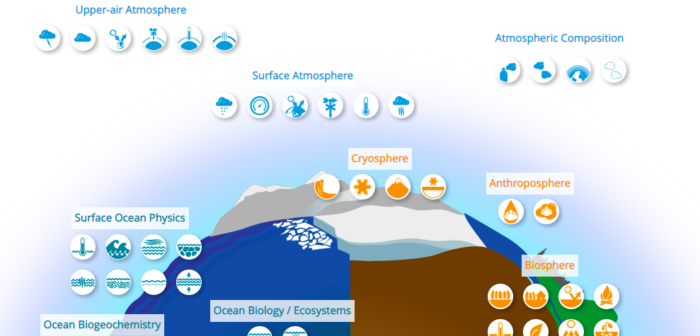A new report outlining the condition of the world’s climate observational capabilities has been submitted to the UN Framework Convention on Climate Change (UNFCCC) for consideration at COP26 in Glasgow, UK, in November.
The State of the Global Climate Observing System 2021 report identifies improvements in Earth observational capabilities and highlights outstanding issues and gaps.
The Global Climate Observing System (GCOS) is co-sponsored by the WMO, the Intergovernmental Oceanographic Commission of the United Nations Educational, Scientific and Cultural Organization (IOC-UNESCO), the United Nations Environment Programme (UN Environment), and the International Science Council (ISC). It regularly assesses the status of global climate observations of the atmosphere, land and ocean and produces guidance for its improvement.
The latest report provides findings for each of the Essential Climate Variables (ECV) covering the atmosphere, land and the ocean. The 54 ECVs include:
- Atmosphere: land surface temperature and precipitation; the Earth radiation budget; lightning; wind speed and direction; water vapor; greenhouse gases; clouds, aerosols and ozone.
- Land: lake, rivers, groundwater; glaciers and ice sheets, permafrost and snow; land cover and surface temperature; soil carbon and soil moisture.
- Ocean: ocean surface heat flux; ocean temperature; ocean currents, sea ice; sea level; transient tracers; oxygen; marine ecosystems.
Since the last report was submitted in 2015, the GCOS strategy has evolved from a focus on individual ECVs to embracing their interconnections in global or continental-scale budgets of energy, carbon and water. According to the report, understanding changes in these budgets and how they are linked is vital to understanding, adapting to and mitigating climate change.
For example, changes in the amount of water in the different components of the Earth system directly affect access to good quality water, which is a basic human requirement, while changes in the energy cycle directly drive impacts such as terrestrial and ocean heatwaves, extreme precipitation and drought. Changes in the carbon cycle directly drive changes in the energy cycle and impact emission targets.
A developing area of work for GCOS involves how the global observing system can support adaptation through climate data supplied by a global system. Data products derived from climate monitoring, together with climate predictions generated from a global climate model and downscaled to the regional and national level, provide climate information at multiple spatial and time scales that meet the requirements of adaptation.
Dr Anthony Rea, director of WMO’s infrastructure department and of GCOS, said, “Securing and extending the observing systems needed for the long-term monitoring of the Earth system as a whole requires substantial efforts and collaboration at all levels including international organizations, national agencies, and scientific communities. The systematic climate observations supported and reviewed by GCOS are implemented through the WMO, the Global Ocean Observing System (GOOS), the Joint Working Group on Climate (WGClimate) of the Committee on Earth Observation Satellites (CEOS) and the Coordination Group for Meteorological Satellites (CGMS), and a broad range of other partners and relevant organizations.”
Since the last report in 2015, GCOS acknowledges that satellite observations have improved, allowing near-global coverage of many variables and providing open access to the data. There also have been many improvements to surface-based observations of individual ECVs across the atmospheric, ocean and terrestrial domains, with new technologies and approaches being developed, especially in the oceans. Archiving and online access to the observations and derived information has also improved.
Overall, however, there are four main areas that still need improvements: ensuring the sustainability of observations; addressing gaps in the system; ensuring permanent, free and unrestricted access to the observations; and increasing support for policies driven by the UNFCCC Paris Agreement.
To view the GCOS 2021 report in full, click here.



